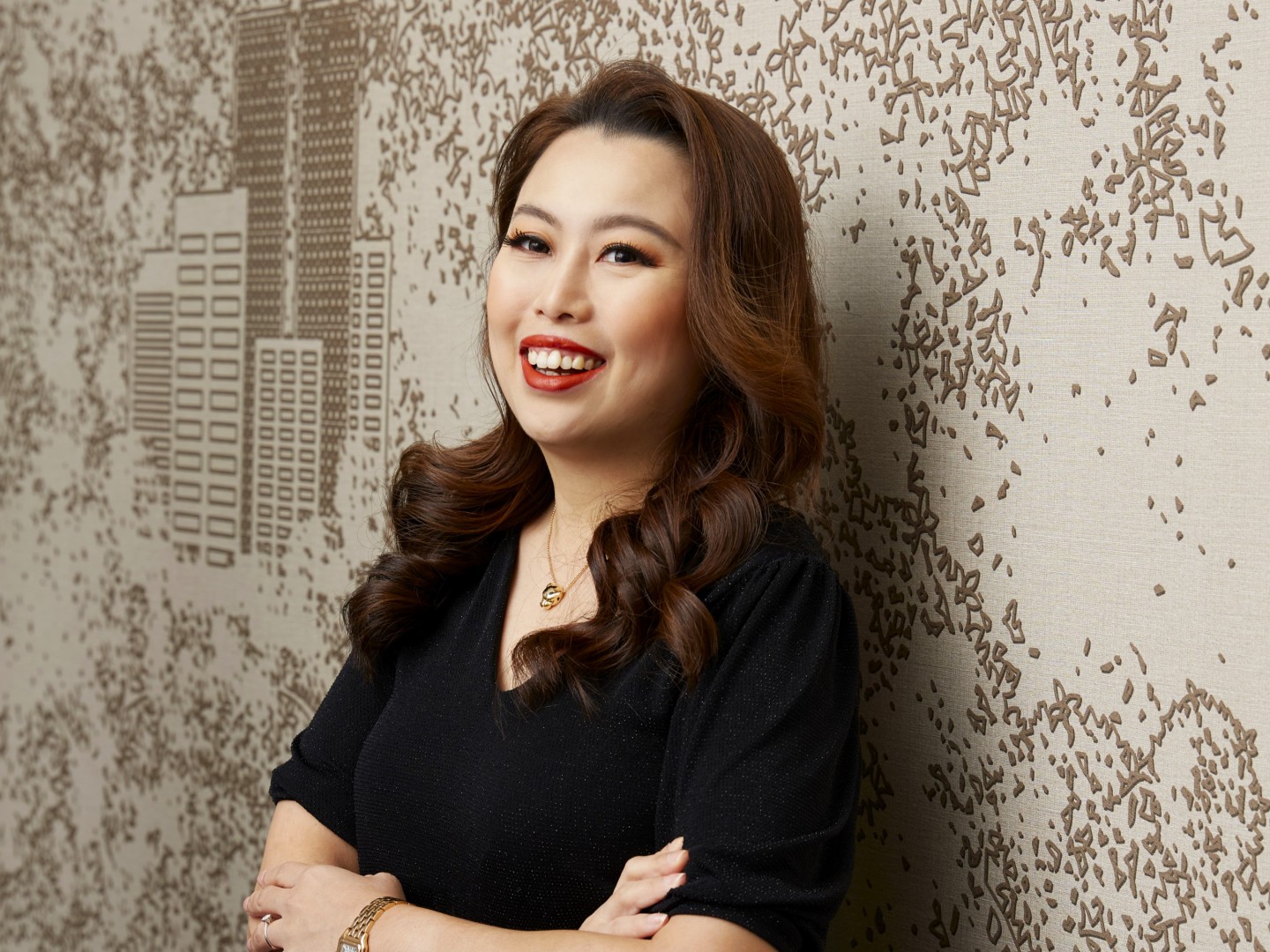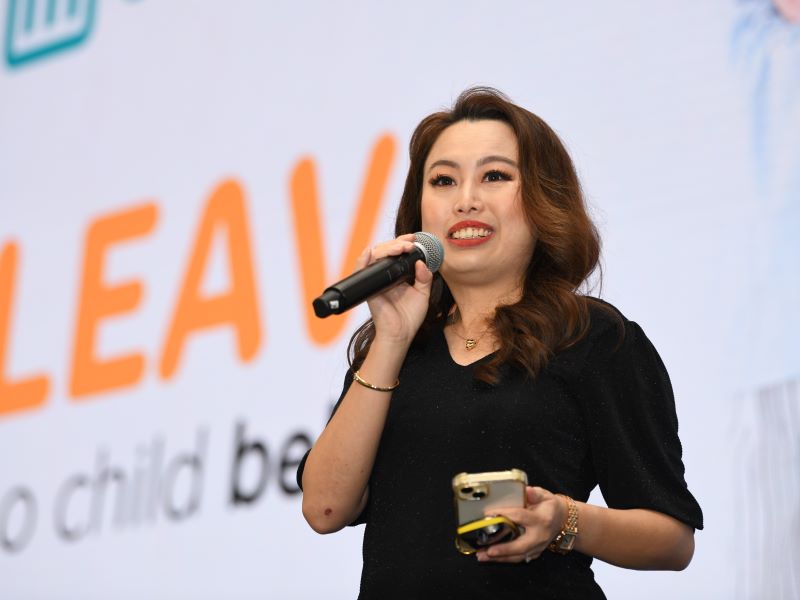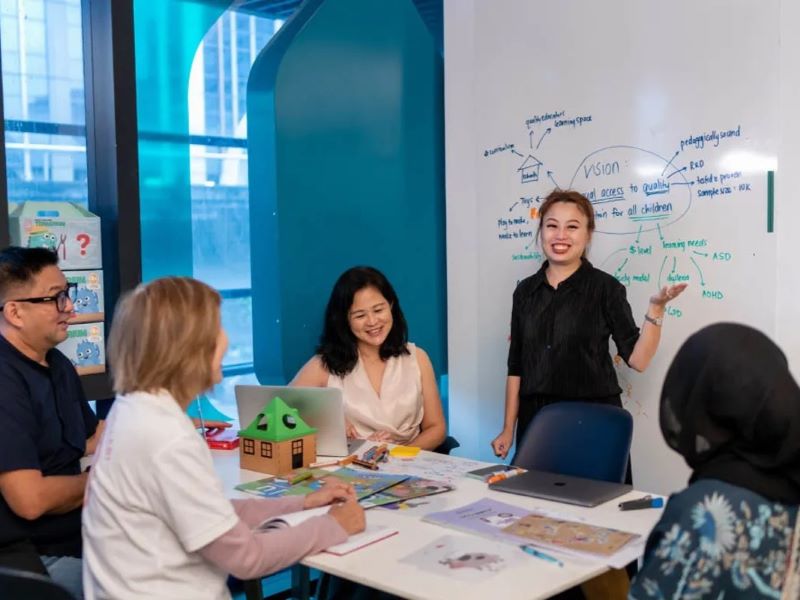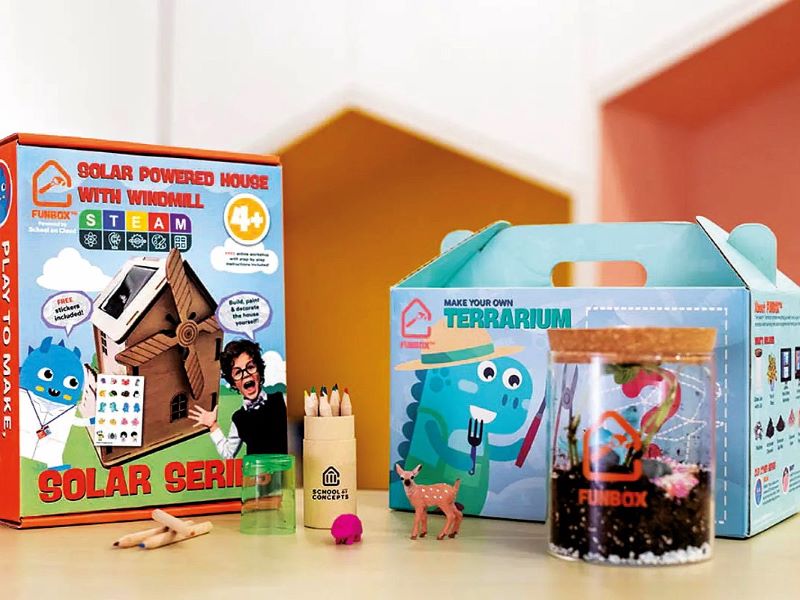
Lim founded School of Concepts (SOC) in 2017, which offers customised education programmes for people of different backgrounds and learning needs (Photo: SooPhye)
The making of a mother is as momentous as bringing a child into the world. Seeing life through the eyes of her curious young daughter reminds Mint Lim of how becoming a mum did not narrrow her ambition but expand it with purpose.
“I grew up in a happy family even though my peers were better off. While other children spent their days at the playground, I climbed trees, learnt math by watching people gamble and sharpened my motor skills by helping the ah ma downstairs roll her cigarettes. But things often felt a little confusing in my head. When I entered kindergarten, I wondered why people understood things a lot faster than I did. In primary school, I had to ask my classmates to repeat what the teacher was saying all the time,” says the Singaporean social entrepreneur.
Lim later realised she has dyslexia, a learning difficulty that primarily affects the skills involved in the fluency of reading and spelling. Words swirl, lines skip and letters jumble on pages at such a frequency that it is enough to make one want to give up. Hiding from her diagnosis or accepting herself as limited would have been the best defence but Lim’s parents thought otherwise. Resilience held her — and her shifting world — in place.
“My dad always told me, it’s okay if people try once and you have to repeat it five times. You still get to the same end point,” she says.
For a seven-year-old, encouragement is a small example of what it means when your parents respect you and your dreams.
dsc_9198.jpg

Growing up, Lim learnt that there is a way of responding to life’s challenges — a kind of open-heartedness to whatever happens — that is more interesting than closing oneself off. She devised a coping mechanism to understand the chain of thought as well as decode and dissect large pieces of information in Sunday school, which taught her how to read. The strategy worked so well that her Primary School Leaving Examination score, a checkpoint to gauge a child’s academic strengths, landed her a place in the prestigious Raffles Girls’ School. She emerged in the top 1% in the national exams.
A passion for business at a young age prompted Lim to start several companies in various fields, including auto parts distribution; floral and design; and tutoring in low-income neighbourhoods. The latter, where she discovered other children who are just like her, inspired the School of Concepts (SOC) in 2017, which offers customised education programmes for people of different backgrounds and learning needs. Combining a phonics and play-based curriculum to create a participatory environment, the social enterprise utilises its own proprietary teaching methodology, ranging from visual and auditory to kinaesthetic (an awareness of one’s body) for children aged two to 12.
Although SOC believes in forming a community where no child is left behind, it is not easy to teach inclusion in a divided world.
“When our children are born, we call them special and beautiful. But along the way, society moulds our perception of what a ‘top kid’ should be. Say, my kid goes to class and there are 40 other students. If my child is not up there, then he or she is not it. But is that really true? If you believe your children came to this world uniquely and beautifully, why would you let a stranger or the world tell them otherwise?”
SOC, which sets aside 30% of enrolment for those from low-income families and provides them with subsidies, expanded from teaching English to programmes that include financial literacy and STEAM (science, technology, engineering, arts and math). Today, SOC has benefited more than 25,000 members through its two branches — SingPost Centre and Our Tampines Hub — as well as classes it runs at community centres and via learning kits. These FunBox(es), as Lim calls them, promote creativity as well as lifelong skills such as critical thinking and problem-solving when users are building a solar-powered house with a windmill or making a terrarium.
mint_lim_and_her_team_1.jpg

Lim’s determination to spotlight children’s needs that may be invisible to most of us caught the attention of Cartier when she spoke at the inaugural raiSE Conference in 2022. The French maison eventually recommended Lim, who had just come out of confinement, to apply for the Cartier Women’s Initiative, an annual international event that drives change by empowering female impact entrepreneurs. Not only did that encounter take her to the prize-giving ceremony in Paris last year, she was also named the first Singaporean fellow of the programme since it was established in 2006 and awarded a US$30,000 grant, obtained mentoring and networking opportunities, and presented education courses from the business school Insead.
With Cartier’s support, Lim has focused her efforts on scaling SOC by establishing additional centres in Singapore while exploring franchise models to open more schools and business-to-business (B2B) partnerships in neighbouring countries. She recently inked a deal in Johor to distribute her toy kits, which will hit the Malaysian market in the second quarter, and is now working with an orphanage in Penang to launch an on-site education centre. Geographical boundaries are no longer a limitation as the brand’s School on Cloud, a digital library teeming with e-storybooks, enables content to be shared seamlessly. Moreover, SOC has also tapped into artificial intelligence (AI) to launch its first mobile learning app, the Alphabet Explorer, powered by augmented reality and voice recognition functions to help toddlers pick up the alphabet in an interactive way. Lim strives to equip one million children with basic English literacy by 2025.
Forwarding good causes with the aid of AI has an enduring appeal but ultimately, people skills will very likely remain the most durable. SOC champions a diverse workforce, of which 30% consists of people with disabilities. For instance, Siti Nurhamizah Hamzah, a staff member with the school since 2019, joined as a classroom assistant trainee after graduating from Singapore’s Association for Persons with Special Needs. The bubbly Hamizah, also the country’s para bowling champion, took home a bronze medal at the Special Olympics World Games in Berlin last year.
soc_fun_boxes.jpg

We are often taught to govern with kindness but it is a feeling we rarely allow ourselves to indulge in. “Go easy. Don’t be overly self-critical,” people say.
It is simple enough advice, yet many feel compelled to give it because such an act is not easy to follow. Therefore, Lim leads by example. Women make up nearly 80% of SOC’s operations and more than half of them, from ground staff to senior management, are back-to-work mothers. Juggling professional and childcare responsibilities should not hinder them from getting ahead.
“I know it sounds clichéd, but I cannot emphasise enough the importance of love. At SOC, when someone is late to work, we don’t ask, ‘Why are you late?’ but ‘Are you okay?’ Sometimes, that is just what the person needs — empathy. We have a direct connection between our brain and our heart; it is a straight channel,” explains Lim.
“People often ask how I manage being a mother, daughter and daughter-in-law. But I’ve never seen myself as separate entities. These roles are fully connected because everything I do, I do out of love.”
With the increasing number of latchkey children in today’s society, SOC aims to incorporate parent-child activities and opportunities into lessons to cultivate bonding. This “new wave of poverty in Singapore”, as Lim calls the rise of emotionally or attention-deprived children, can be reversed through education. If toys were a gift back in the day, Lim hopes her FunBoxes — and a chance at love — will be a given in the future.
This article first appeared on Mar 25, 2024 in The Edge Malaysia.


